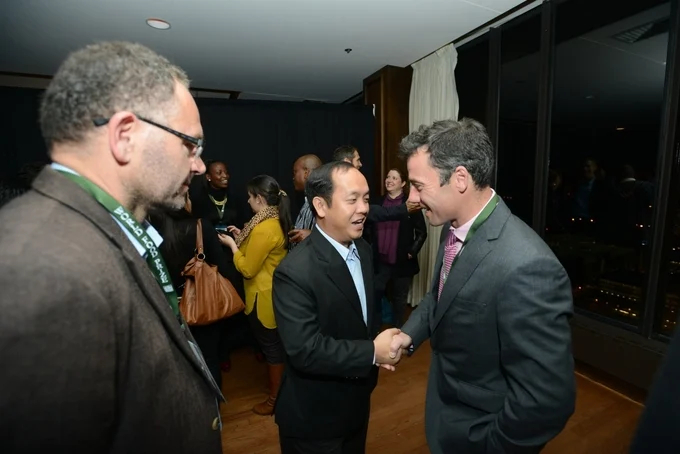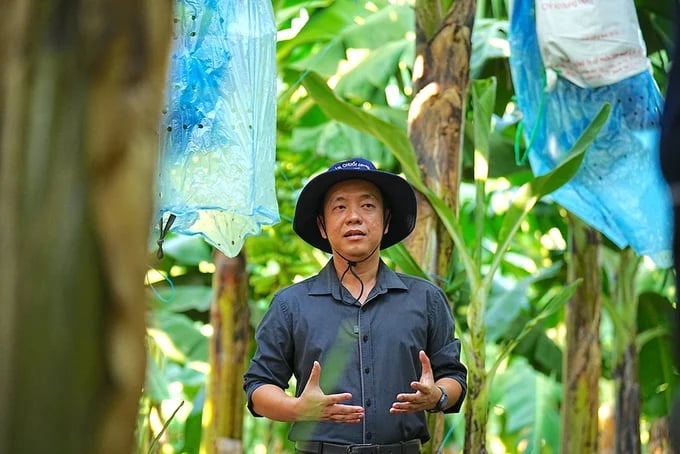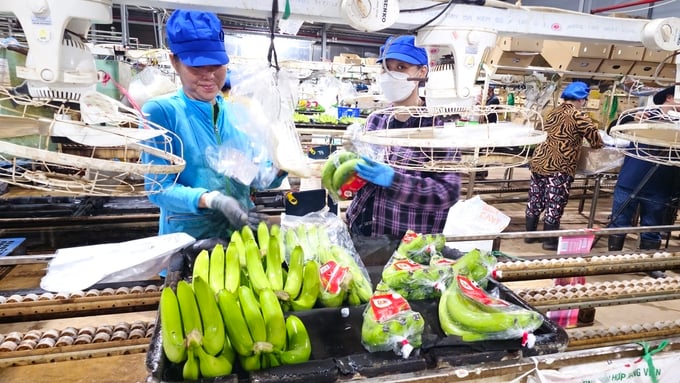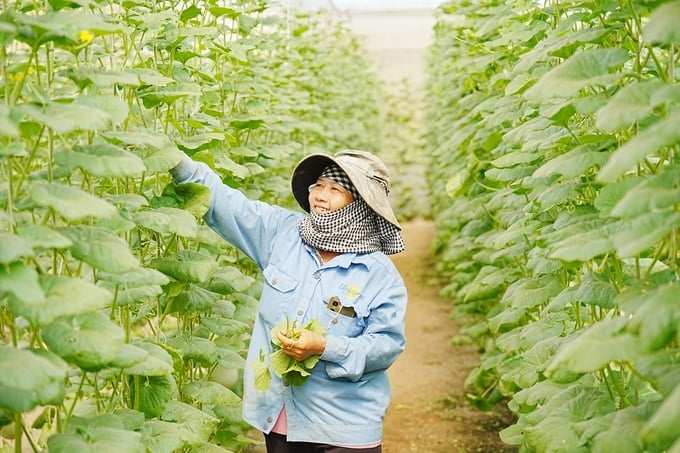May 20, 2025 | 21:51 GMT +7
May 20, 2025 | 21:51 GMT +7
Hotline: 0913.378.918
May 20, 2025 | 21:51 GMT +7
Hotline: 0913.378.918
A brisk wind rustles the remnants of wild sunflowers from the previous winter along the straight red dirt road, weaving through vast green banana fields bathed in morning sunlight. Amidst this picturesque scene, groups of people are engrossed in farming activities, their voices and laughter mingling with the hum of mechanical machines. It's a vibrant atmosphere, brimming with rejuvenating energy — the perfect setting for an engaging conversation with businessman Pham Quoc Liem, Chairman of Unifarm Company, at An Thai high-tech farm.

Pham Quoc Liem discussed with world agricultural experts in the United States in 2014.
Unlike his usual attire for agricultural forums, Liem is dressed casually in farming clothes as he chats with me in his organic banana greenhouse. At this moment, he resembles more a farmer than a businessman overseeing a large agricultural enterprise in Vietnam. Perhaps it's the broad forehead with thinning hair, the sharp eyes, the sincere manner of speaking, and the gentle smile that still exudes confidence — unmistakable traits of a man deeply passionate about agriculture and the well-being of farmers.
As Liem shares his personal journey, he paints a portrait of himself as not just a businessman, but also a farmer and an advocate fervently dedicated to the cause of agriculture and the welfare of farmers.
Liem was born in the early 1980s in Phu Hung, a modest hamlet within An Son commune, Thuan An district, Song Be province (now Binh Duong province). His father, an auto mechanic, and his mother, an elementary school teacher, constituted a rare intellectual presence in the region. Separated by the gentle Ba Lua River — which lacked a bridge at the time — on the opposite bank lay Phu Tho ward in Thu Dau Mot town, renowned for its traditional handicraft "furnaces" such as clog kilns, dish kilns, and carpentry kilns. At night, electric lights illuminated that side, while Phu Hung remained a purely agricultural hamlet, its fields alive with rice and vegetable cultivation, illuminated only by the faint glow of oil lamps.
During Liem's formative years, alongside attending school, he accompanied his grandparents, parents, and siblings to the fields to harvest rice. In the evenings, they gathered around the wood stove, exchanging old tales and singing Vong Co songs, emblematic of the ancient Southern tradition.

Pham Quoc Liem: "If I can contribute to enhancing agriculture and improving the lives of Vietnamese farmers, I will never hesitate."
To cross the river, they relied on boats. On days when the river ran low, Liem trudged through the mud to reach the water, then embarked on the long journey to school. When the waters swelled, his friends would occasionally spot Liem drying his books in the schoolyard, having fallen into the river while attempting to board the boat. Such circumstances tempered his resolve. In high school, Liem emerged as a talented class president, excelling in all subjects (particularly literature), displaying prowess in Vong Co singing, and harboring a passion for martial arts.
The dream that lay nestled within the heart of this young scholar was to effect change in his hometown, to improve the lives of his grandparents, parents, and cherished ones. It was as though a seed named agriculture had been planted in the fertile soil of a student from a modest hamlet. Though he didn't pursue agricultural studies at the university level, Liem's childhood dream remained steadfast.
Upon graduating from university with majors in Customs, English Language, and Business Administration, Liem assumed various roles before becoming the Human Resources Director at U&I Group, under the stewardship of businessman Mai Huu Tin. By the end of 2008, Liem persuaded the Group's leadership to entrust him with a new project spanning nearly 500 hectares — the first high-tech agricultural endeavor in Binh Duong province. He made a solemn commitment: if unsuccessful, he would not return to the Group. At the time, Liem was just 28 years old.
“To realize the dream of elevating Vietnamese agriculture to be on par with the world's agricultural powers, the first thing is to learn from these countries.”
Driven by this conviction, Liem embarked on a journey spanning many countries, seeking mastery by studying and collaborating with leading agricultural experts from the US, Israel, New Zealand, Japan, Korea, Taiwan, and beyond. Beyond just acquiring knowledge of technology and farming techniques, Liem delved into understanding large-scale farm management systems, business-farmer cooperation models, and international sales strategies. What Liem whimsically refers to as his "study abroad" experience laid the groundwork for his future expertise in technology, operations, and market penetration.
However, the implementation of agricultural projects for Liem and his international mentors at Unifarm was fraught with countless challenges. They grappled with issues ranging from a dearth of skilled human resources and unsuitable soil conditions to navigating consumer markets.
While successful farming techniques existed for crops like tomatoes, bell peppers, and asparagus, market consumption posed difficulties. These products were initially sold domestically at low prices, unable to cover production costs. Though some agricultural products like eggplant and okra found good markets abroad, they struggled to thrive in the hot, humid, and rainy conditions of An Thai.
Even the melon and banana cultivation project, which has since established Unifarm's brand in the international market, faced initial hurdles with people, farming techniques, and market consumption. There were periods when Liem and his team worked tirelessly, almost round-the-clock, experimenting with various farming methods tailored to the soil and local conditions.
Simultaneously, Liem tirelessly endeavored to bring products to market, from personally delivering melons to supermarkets in Ho Chi Minh City at night to gaining insights into industry operations. He traversed cities like Seoul, Korea, and Tokyo, Japan, promoting Vietnamese old bananas with unique flavors.
Throughout this arduous journey, Liem pondered strategies and philosophies in production and business to enhance the competitiveness of Vietnamese agricultural products in the international arena. He championed the principle: "One highest product standard for all markets," ensuring that Unifarm's agricultural products met the stringent requirements of major Asian markets, including Korea, Japan, China, and the Middle East.
Each newly opened export market brought immense satisfaction, not only to Liem and his colleagues but also to Vietnam's high-tech agriculture industry at that time, serving as a testament to their unwavering efforts.

The principle of "One highest product standard for all markets" ensures that Unifarm's agricultural products are universally accepted by major Asian markets, including Korea, Japan, China, and the Middle East.
Following initial successes at Unifarm, Liem initiated technology transfer programs for businesses, cooperatives, and farming households across numerous provinces and cities in Vietnam. Many of these transferred businesses have flourished into large and reputable entities within their respective industries. Consequently, Liem has earned the humorous moniker of "teacher of agricultural kings."
"I firmly believe farming isn't about competing with or replacing the role of farmers, but rather about creating appropriate models and platforms for products and supply chains, then transferring and replicating them for businesses, cooperatives, and farming households. The ultimate goal is to elevate Vietnamese agriculture, enabling farmers to lead prosperous lives from their fields and gardens. That's how I've realized my childhood dream," Liem concludes with conviction.
To many, Liem may not appear outwardly active; he is reserved and avoids public displays of ostentation. However, when the topic shifts to agriculture, Liem transforms into a different persona, articulating detailed and meticulously prepared information and arguments with the poise of a seasoned professional speaker or writer. Every encounter with Liem reveals his contemplation of a different aspect of agricultural concern.

Pham Quoc Liem constantly discusses solutions to attract high-quality human resources into agriculture.
For a period, Liem fretted over Panama wilt disease affecting banana trees, a scourge that had devastated major banana-growing regions worldwide and had infiltrated banana plantations in Vietnam. Yet, a few years later, he proudly announced his success in selecting a banana variety capable of resisting this pernicious disease at an impressive rate of 95%, while retaining favorable commercial qualities.
Occasionally, Liem is troubled by the rapid quantitative expansion of some of Vietnam's key agricultural export products, juxtaposed with the challenge of maintaining their quality standards. However, he draws on the lessons and solutions from his diligent research in various countries.
Recently, Liem has been actively discussing strategies to attract high-quality human resources into agriculture, enhance product quality and management capacity, and implement automation technology, biotechnology, and digitalization in farming practices. These endeavors aim to confer a competitive advantage upon Vietnamese agricultural products in the international market, amid the burgeoning era of technology and artificial intelligence (AI).
Initially, one may wonder if Liem's relentless pursuit of agricultural advancements stems from his childhood love for agriculture and sense of responsibility toward farmers, bolstered by years of tireless dedication and fortified physical, mental, and spiritual resilience. Indeed, the indomitable spirit of a Vovinam practitioner imbues this 44-year-old with seemingly boundless energy when tackling issues within Vietnam's agricultural sector.
"There is no worthwhile revolution that comes without significant effort, investment, and time. Within my capacity, if I can contribute to improving agriculture and fostering a better life for Vietnamese farmers, I will never hesitate," Liem asserts definitively.
Author's note
There are myriad ways for individuals to express their love for their country, homeland, and fellow citizens. The endeavors of young visionaries like Liem inspire a steadfast belief in the prosperity of Vietnamese agriculture in the near future. Such actions are emblematic of patriotism in its truest form!
Translated by Quynh Chi

(VAN) Khanh Hoa is investing over 545 billion VND to develop 240 hectares of high-tech marine aquaculture in order to guarantee a consistent supply of seafood exports and achieve the USD 1 billion target.

(VAN) Minister of Agriculture and Environment Do Duc Duy held a meeting with Soopakij Chearavanont, Chairman of C.P. Group, on May 15.
/2025/05/16/3800-0-nongnghiep-143756.jpg)
(VAN) Suntory PepsiCo Vietnam coordinated with the Ministry of Education and Training to implement an education program on water conservation, reaching nearly 1 million primary school students nationwide.

(VAN) Vietnam’s TH Group officially put its high-tech fresh milk processing plant into operation in the Russian Federation, marking a historic moment as the first TH true MILK cartons were produced in Russia.

(VAN) Use of high-quality broodstock and biotechnology is regarded as the most effective approach to ensuring sustainable and economically viable shrimp aquaculture ahead of climate change and the emergence of increasingly intricate disease patterns.

(VAN) Carbon farming is a form of agricultural practices that helps absorb more greenhouse gases than it emits, through smart management of soil, crops, and livestock.

(VAN) This is a key content of the Memorandum of Understanding recently signed between the Vietnam Fisheries Society and Kunihiro Inc of Japan.